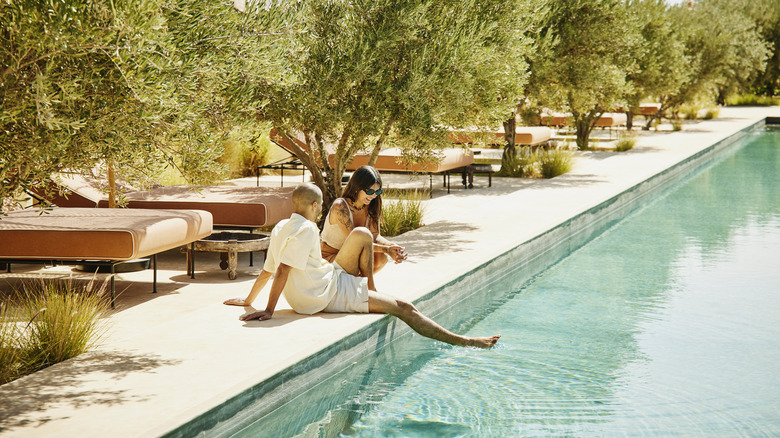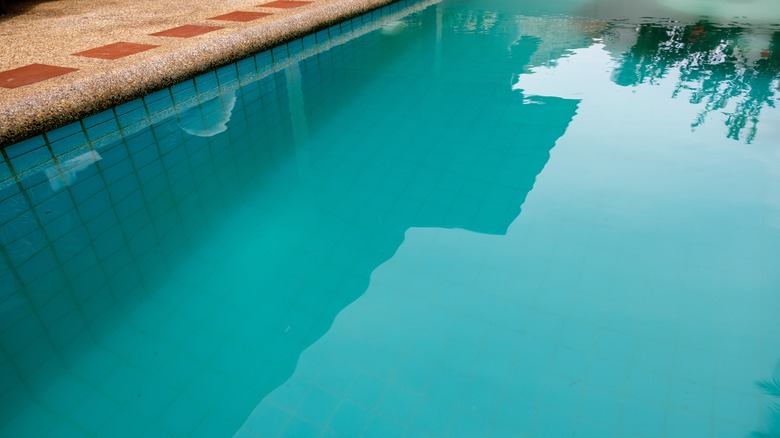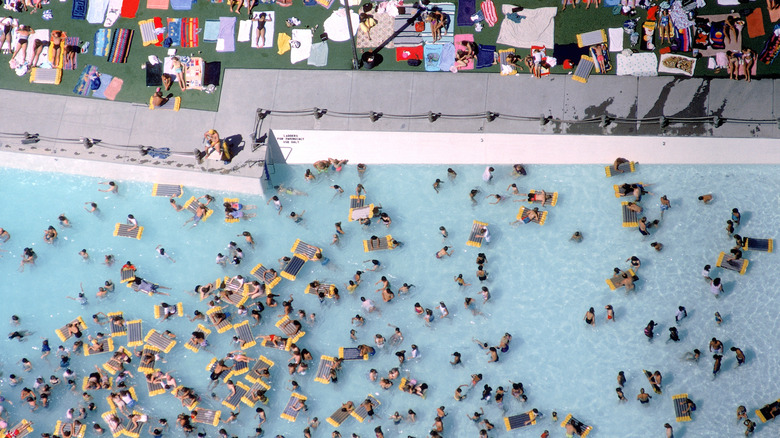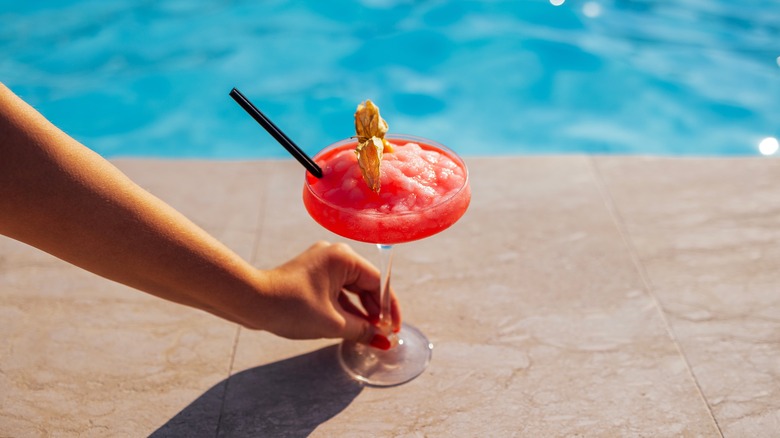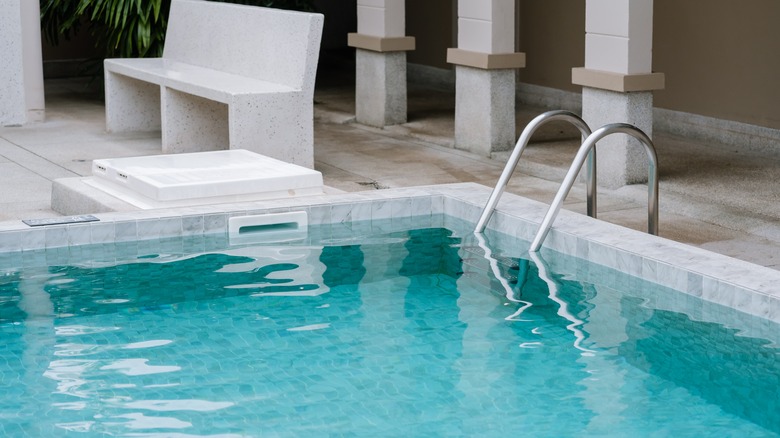5 Warning Signs That A Hotel Pool Isn't Safe To Swim In
A sparkling, clean pool is the cherry on top of a relaxing resort experience — an amenity many of us pay extra to enjoy. In fact, pools and hot tubs are one of the top three amenities hotel guests look for, according to a survey by water management company VivoAquatics. However, when the hotel pool's surface looks a little murky, or when there's a greenish hue that tints the water, you're right to question whether it's actually safe to swim in. After all, while some visual or odor cues are purely cosmetic, others represent a telltale sign that something is wrong with the water.
From bacteria infestations and algal blooms to physical hazards that lead to slips and falls, even the most luxurious swimming pool can harbor a range of dangers hidden below the surface. That said, one of the best ways to find out if your hotel pool is safe is simply by asking the manager directly about the last time they tested the water. Ideally, attendants should be checking chemical levels at least twice a day to ensure everything is working properly. Nonetheless, inspection reports don't always tell the full story. Ultimately, whether you're planning on diving into one of the most amazing hotel pools around the world, or hitting up the best swim-up suite resorts in the tropics, these red flags will help you determine if the pool is actually safe for a swim.
The pool water is cloudy or murky
Cloudiness in pool water is a red flag you should never ignore. A symptom of several problems, typical causes range from poor pH balance to a broken filter or sunscreen that's washed off into the water. Improperly pH-balanced water is especially noteworthy because it can lead to the growth of harmful bacteria and algae, including E. coli. Often found in feces, these bacteria can't survive in chlorinated water with the proper pH balance. However, if left unchecked, subsequent infections can cause diarrhea, nausea, and stomach pain (via Mayo Clinic).
Cloudy water is not only an indicator that bacteria may be present, but it also contributes to drownings because lifeguards and family members can't clearly see swimmers in distress. In fact, in 2011, a Massachusetts public pool's murky water hid a body for two days while other swimmers continued to use the pool, as reported by CBS News.
Finally, murky water is also dangerous for divers and anyone else jumping into the water. Since swimmers can't accurately judge the water depth, it's easy for them to misjudge depth and get injured. Incidents like this highlight the dangers of poor visibility caused by cloudy water.
There are lots of people (or babies) in the pool
When it comes to using a public or hotel pool, your chances of catching a dreaded stomach bug increase when there are more people in the water. So, while many gastrointestinal ailments claim to be the one and only "stomach bug," the truth is that your stomach distress could actually be caused by numerous bacteria, parasites, and viruses. However, Cryptosporidium — sometimes shortened to "Crypto" — is a particularly nasty microscopic parasite that can survive in chlorinated water for over a week. Beyond that, it's also the number one cause of waterborne illnesses in the U.S. — infecting roughly 823,000 people every year, according to a report by the CDC.
Unfortunately, you're probably familiar with the symptoms: headache, diarrhea, stomach ache, fever, and a general feeling of yuck. In most cases, swimmers become infected when they swallow contaminated water. And even if you're not actively drinking gulps from the infinity pool, studies show that the average adult swallows a little over an ounce of pool water per hour. And, while that might not seem like a lot, it's definitely enough to get you sick.
So, to avoid becoming intimately acquainted with the hotel bathroom, make sure you skip crowded pools. Also, pay attention to how many people shower before entering the water, as rinsing off with soap reduces the chances of spreading the germ. Finally, you'll also want to rethink your swim if there are a lot of babies in the pool. Crypto lives in human and animal feces, and diaper leakage is hard to contain.
Swimmers have glassware in the pool
While sipping a fruity beverage in the oceanfront pool might seem like heaven, stepping on a piece of broken glass will put a damper on your vacation fun. Plus, given the fact that swimming in the ocean with an open cut is not safe because it puts you at risk of contracting vibriosis, and other potentially deadly saltwater infections, nothing will ruin your vacation quicker. With that in mind, a reputable pool bar should never serve its drinks in glass containers. However, rowdy guests are sometimes known for pushing the rules. This, coupled with the fact that some bars have lax policies, can lead to accidents.
To make matters worse, if a glass ever breaks in or near the water (no matter how small), the hotel must close and drain the entire pool. Even the tiniest slivers must be removed before it's safe for the pool to be refilled. And, depending on the size of the pool, the entire cleaning process can cost north of $10,000.
Now, while you'd hope that anyone who breaks a glass would immediately notify the pool guard, that doesn't always happen. In fact, there are Reddit threads with stories about accidents due to glass in pools. Similarly, a quick internet search also reveals plenty of solicitors and lawyers offering legal advice to hotel guests who have been accidentally cut by broken glass in the water.
The water has a greenish tinge
Germs like Crypto can't be seen in the water, but algae often turns the water green — ranging from a vivid emerald to a more subtle shade. These tiny microorganisms love warm water, and often grow on the walls or float freely in the pool. In most cases, excessive algae growth occurs due to low chlorine levels, poor filtration, or high water pH, among other factors. Although the algae found in your pool usually isn't toxic, it provides the ideal environment for more dangerous bacteria and parasites to multiply.
E. coli, Crypto, and Giardia — a super-contagious intestinal infection caused by a parasite — all thrive in algae-rich pool water. Throw in the potential of catching run-of-the-mill Recreational Water Illnesses (RWIs) like skin rashes or norovirus, and taking a dip in green water just isn't worth the risk. It's also worth noting that even floating on top of an algae-contaminated swimming pool isn't safe either. While your chances of ingesting the water are low, you can still get it on your skin or in your eyes.
Finally, green pools can also lead to physical injuries. For instance, algae growing on stairs or ladders poses a slipping risk when you enter or exit the pool. This is especially true if the water is already slightly green, since it will be even more difficult for you to see algae growing on pool walls or floors.
The pool smells strongly of chlorine
"Pool smell" is a nostalgic reminder of many a well-spent childhood summer, but it can also be an indication that a swimming pool is unsafe to enter. While you might think that an eye-watering, pungent odor is a sign that there's too much chlorine in the water, it's actually the opposite.
When chlorine in the water interacts with ammonia found in sweat, urine, and even skin care products, it forms a new chemical compound — chloramine. This compound produces the smell we typically associate with excessive chlorine. To get rid of this "pool smell," the pool inspector needs to add more chlorine to the water in order to eliminate the available ammonia and stop the formation of chloramines.
Not only does "pool smell" indicate that the water's chemical balance isn't quite right, but the chloramines themselves can also irritate the eyes. When these compounds evaporate, they get into swimmers' eyes — which can then lead to itching and redness. Additionally, a high concentration of chloramine can also cause coughing and skin irritation, which definitely doesn't make for a fun vacation. Ideally, a hotel pool should have no odor at all. So, if it smells like the local YMCA of your childhood, don't get in.
